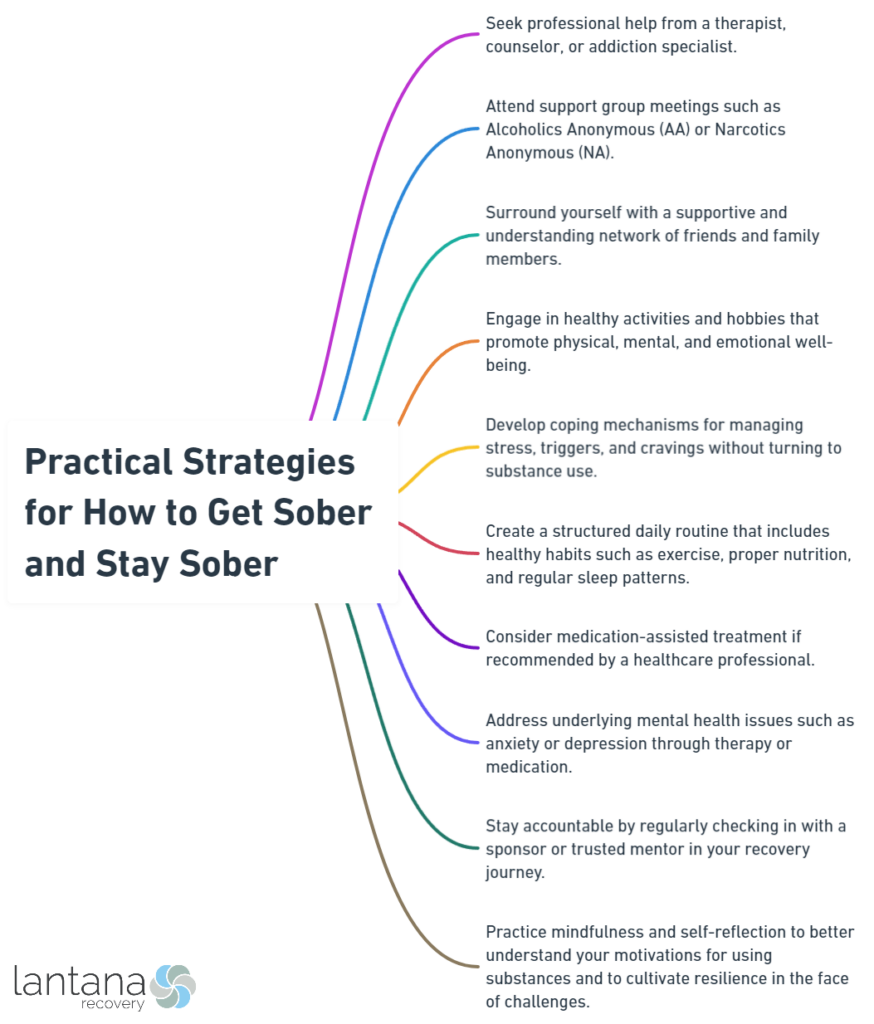Are you ready to commit to a sober lifestyle and finally break free from the chains of addiction? The journey ahead may be challenging, but with the right mindset, support, and strategies, you can achieve lasting sobriety. In this blog post, you’ll learn practical strategies on how to get sober and stay sober, build a strong support network, and develop healthy coping mechanisms to ensure long-term success. Let’s embark on this transformative journey together!
Short Summary
- Recognize the need for change and seek professional help to achieve sobriety.
- Build a supportive network and develop coping skills & strategies to manage triggers.
- Utilize aftercare, family therapy & mutual support groups for ongoing recovery success!
Understanding Sobriety and Substance Use Disorder

Sobriety is more than just abstaining from substance abuse; it’s about embracing a substance-free life and all the amazing benefits that come with it, such as improved mental and physical health, better relationships, and increased self-confidence. To stay sober, one must commit to this lifestyle and its positive impacts.
However, achieving and maintaining sobriety is often an uphill battle, especially for those struggling with substance use disorder. This complex condition is characterized by a problematic pattern of substance use that causes distress and impairs daily life activities, making it challenging to quit.
Recognizing the need for change is the first step towards a healthier lifestyle and overcoming addiction. No matter how daunting the journey may seem, there is a multitude of resources available, such as mental health services, addiction treatment facilities like Lantana, Columbia, and support networks, to help guide you through the process of getting sober and staying sober.
What is Sobriety?
Embracing sobriety means unlearning unhealthy coping mechanisms that involve substances and learning how to live life without them. It’s about setting inspiring sobriety goals, whether short-term or lifelong and working towards achieving them with determination and resilience.
Sobriety is a lifelong process, but the rewards are worth the effort. As you progress on your journey, you’ll experience increased self-confidence, improved relationships, and a renewed sense of purpose, ultimately leading to a happier, healthier, and more fulfilling life.

Substance Use Disorder
Substance use disorder, often associated with drug abuse, is an important mental health condition that involves both legal and illegal substances, characterized by compulsive drug-seeking and continued use despite harmful consequences. This disorder can have far-reaching effects on an individual’s life, including physical and mental health complications, financial struggles, relationship difficulties, and legal issues.
Recognizing the importance of making a change is crucial, and seeking professional help and support from mental health services, addiction treatment facilities, or a supportive network of family and friends can be a great starting point to help make that change.
Recognizing the Need for Change
Recognizing the need for change is the first crucial step towards overcoming addiction and embracing a sober lifestyle. This involves acknowledging the negative consequences of substance use, such as health problems, financial difficulties, or relationship issues, and being prepared to make a change.
Dealing with past mistakes, managing withdrawal symptoms, and learning from past experiences are all essential steps in the process of achieving and maintaining sobriety. It’s important to be honest with yourself about your struggles and seek the help and support you need to make lasting, positive changes in your life.
Seeking Professional Help and Support

Reaching out for professional help and support from experts at Lantana is a crucial step in your sobriety journey. By engaging with mental health services, addiction treatment facilities, or building a support network, you can access valuable mental health resources and guidance on your path to sobriety. Whether you visit a mental health services administration, an addiction treatment facility, or simply start a conversation with your healthcare provider about your drug and alcohol use, taking a proactive step towards your well-being can make all the difference in your recovery process. As you progress, you may find the need for more mental health resources to ensure a successful journey.
In addition to professional support, establishing a strong support network of family, friends, and peers can provide the encouragement and accountability you need to stay on track. Participating in support groups such as Alcoholics Anonymous or SMART groups. Recovery can also offer a safe space to share your experiences and draw strength from others who have faced similar challenges.
Remember, you’re not alone in this journey, and seeking help and support can significantly increase your chances of achieving lasting sobriety.
Mental Health Services Administration
The Substance Abuse and Mental Health Services Administration (SAMHSA) plays a critical role in providing essential substance abuse and mental health treatment services to those in need. By offering a range of services such as grants and funding for treatment programs, research and data collection, and public education and awareness campaigns, SAMHSA helps ensure that individuals have access to the resources they require to get sober and remain sober.
By taking advantage of these valuable resources, you can empower yourself to make informed decisions and take the necessary steps toward a healthier, substance-free life.
Addiction Treatment Facilities
Addiction treatment facilities, such as Lantana Recovery, provide invaluable support and treatment facilities for individuals struggling with substance abuse and addiction. These facilities offer a range of services, such as detox centers, residential rehab programs, outpatient services, and mental health care, tailored to help individuals conquer addiction and secure long-term recovery.
Inpatient programs provide a more intensive and supportive treatment experience, while outpatient programs offer greater flexibility, allowing individuals to continue with their daily lives. By seeking help from addiction treatment facilities, you can access the specialized support and guidance necessary to achieve and maintain sobriety.
Building a Support Network
Creating a strong support network is one of the most beneficial steps you can take to ensure a successful path to sober living. A support network can consist of friends, family, and peers who offer emotional, financial, and practical assistance during your sobriety journey.
In addition to providing encouragement and motivation, a solid support network can help you develop new coping strategies, maintain accountability, and navigate challenges that may arise along the way. By surrounding yourself with supportive individuals who understand and share your commitment to sobriety, you’ll be better equipped to face the obstacles ahead and stay on track toward long-term recovery.
Developing Coping Skills and Strategies

Developing effective coping skills and strategies is crucial for maintaining sobriety and preventing relapse. By identifying and managing triggers, building supportive relationships, and practicing self-care, you can empower yourself to overcome challenges and remain steadfast in your commitment to a sober life. It’s important to remember that maintaining sobriety is a lifelong process, and continuously refining your coping mechanisms and strategies will help you stay resilient in the face of adversity.
One key aspect of developing coping skills and strategies is learning to identify and manage triggers that may lead to substance use. This involves recognizing high-risk situations and developing healthy coping skills to navigate them effectively like learning how to sober up to drive.
Additionally, building healthy relationships and avoiding toxic ones can provide the emotional support and encouragement needed to stay committed to your sobriety goals.
Finally, practicing self-care and achieving balance in life can help reduce stress and improve overall well-being, further supporting your sobriety journey.
Identifying Triggers
Triggers are powerful internal or external factors that can cause a person to relapse into substance abuse. They can be related to emotions, people, places, things, or situations associated with past drug or alcohol use. By becoming aware of your triggers and developing strategies to manage them, you can better equip yourself to handle high-risk situations and maintain your sobriety.
This may involve avoiding certain environments, practicing mindfulness techniques, or seeking support from friends, family, or a professional counselor when faced with challenging triggers.
Healthy Relationships

Building healthy relationships and avoiding toxic ones are essential components of maintaining sobriety. A strong and healthy relationship involves honesty, trust, respect, open communication, affection, and mutual give-and-take. By nurturing supportive relationships and distancing yourself from those that may jeopardize your sobriety, you can create a stable environment that promotes your well-being and fosters your commitment to a substance-free life.
Remember, the people you surround yourself with can significantly influence your recovery journey, so choose your connections wisely.
Self-Care and Balance
Practicing self-care is crucial for maintaining sobriety, as it helps reduce stress, improve mental and physical health, and promote overall well-being. “Successful recovery reflects self-acceptance and an ongoing quest to connect with the transpersonal realm” (Recovery from Alcoholism: A Spiritual Journey, Bowden, 2009.) Self-care can involve activities such as maintaining a regular sleep routine, eating a balanced diet, engaging in physical activity, spending time in nature, and pursuing hobbies that bring you joy.
Achieving balance in life, by setting aside time for work, rest, and play, can further support your sobriety journey, helping you stay resilient in the face of challenges and setbacks.
Remember, taking care of yourself is not a luxury, but a necessity in your journey towards a healthier, happier life.
Utilizing Aftercare and Ongoing Support

Aftercare programs and ongoing support play a critical role in promoting lasting sobriety, providing invaluable support and guidance throughout the recovery journey. These resources can help you stay on the path of recovery, develop effective coping skills, and build a strong support network to prevent relapse and maintain your sobriety.
In addition to formal treatment programs, family therapy, and support, as well as mutual support groups, can offer continued encouragement and assistance in your quest for a substance-free life. Combining in-person and online support methods can offer a more comprehensive support system and access to a wider range of resources.
Participating in support groups such as Alcoholics Anonymous or SMART groups. Recovery can provide a safe and supportive environment where individuals can share their experiences and draw strength from others who have faced similar challenges. By taking advantage of these various aftercare and ongoing support resources, you can increase your chances of achieving lasting sobriety and living a fulfilling, substance-free life.
Formal Treatment Programs
A formal treatment program offers specialized assistance to those struggling with addiction, including inpatient or outpatient programs, therapy, medication, and other forms of support. These programs are crafted to help individuals conquer addiction and secure long-term recovery, empowering them to develop effective coping skills, create a strong support network, and recognize triggers that could lead to relapse.
By participating in formal treatment programs, you can access the necessary tools and resources to reach your long-term recovery goals and maintain your sobriety.
Family Therapy and Support
Family therapy can play a significant role in addressing underlying issues and providing support for individuals in recovery. By improving relationships among family members and helping them better understand, support, and work through difficult situations, family therapy can foster a nurturing environment that promotes recovery and long-term sobriety.
Engaging with family and friends who are supportive of your recovery can further encourage and motivate you, reinforcing new behaviors and providing positive incentives to keep up with your treatment.
Mutual Support Groups
Mutual support groups, such as Alcoholics Anonymous (AA), Narcotics Anonymous (NA), SMART Recovery, and All Recovery groups, offer a secure and encouraging atmosphere where people can exchange their stories and draw strength from each other. Furthermore, they can give a sense of community and connection, which can be immensely valuable in the process of achieving sobriety.
Studies have shown that mutual support groups can be just as effective as 12-step programs and may significantly increase the chances of success for those who are dedicated to maintaining a lifetime of total abstinence
Summary
In conclusion, achieving and maintaining sobriety is a challenging but rewarding journey. By understanding the importance of recognizing the need for change, seeking professional help and support, developing coping skills and strategies, and utilizing aftercare and ongoing support resources, you can empower yourself to overcome addiction and embrace a substance-free life. Remember, you are not alone in this journey, and with determination, resilience, and the right support system, you can achieve lasting sobriety and live a healthier, happier, and more fulfilling life.
Frequently Asked Questions
How do you get completely sober?
Take the first step towards sobriety and recognize the need for change. Then, reach out for help, find the right treatment program, get through withdrawal, choose the right therapy, and build support networks for your recovery. Finally, participate in aftercare programs at Lantana Recovery in Columbia to stay sober.
How do you stay motivated to stay sober?
Start each day with something fun, plan a weekly celebration, revisit childhood activities, study an interesting subject, and set goals to stay motivated and sober.
These activities can help you stay focused on your sobriety and provide a sense of accomplishment. They can also help you stay connected to your friends and family, and give you something to look forward to each day.
What are good sober habits?
Establish a daily routine with regular sleep, exercise, meals, support groups, and sober activities to reduce stress and fill free time, creating good sober habits.
Why is it so hard to stay sober?
It can be hard to stay sober due to physical symptoms of withdrawal and intense cravings that are difficult to manage without help. Additionally, the first few weeks of sobriety can be especially challenging, making it even harder to resist relapse.
What is the difference between inpatient and outpatient addiction treatment programs?
Inpatient addiction treatment programs provide a more intensive, supportive environment for individuals to focus on their recovery, while outpatient programs offer greater flexibility to continue with daily life while in treatment.
Outpatient programs allow individuals to continue with their daily lives while in treatment, such as attending school or work, and provide more flexibility than inpatient programs. However, inpatient programs provide a more intensive and supportive environment for individuals to focus on their recovery.









